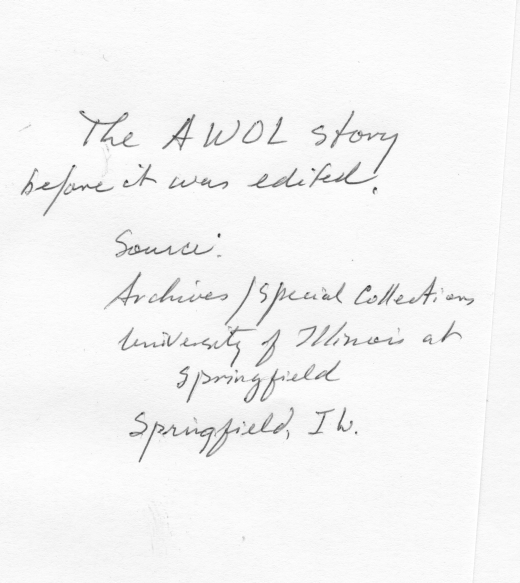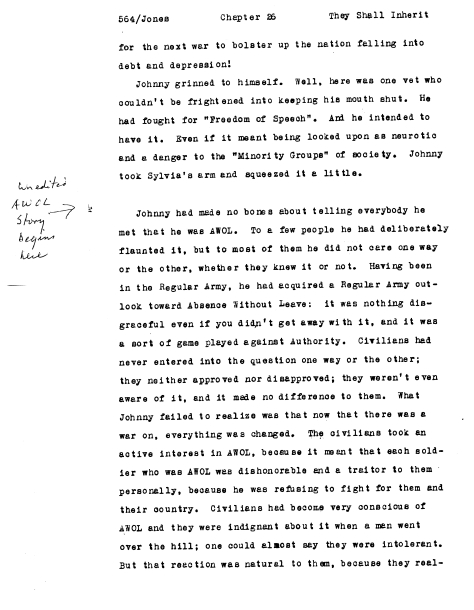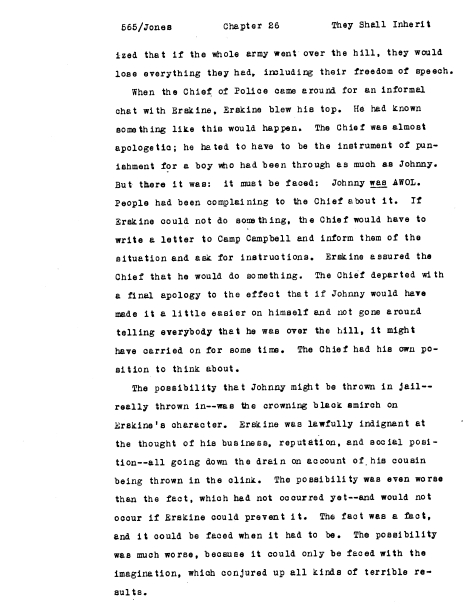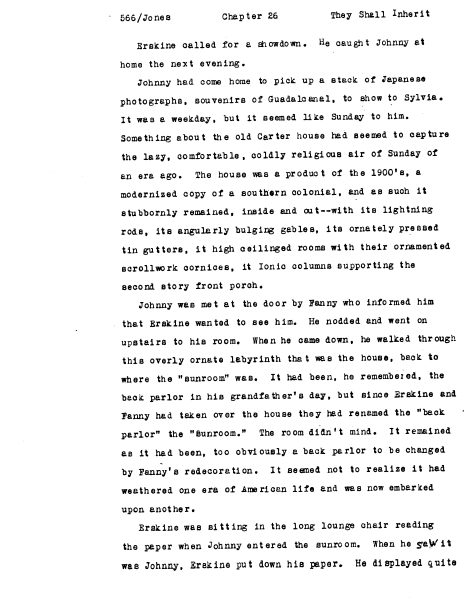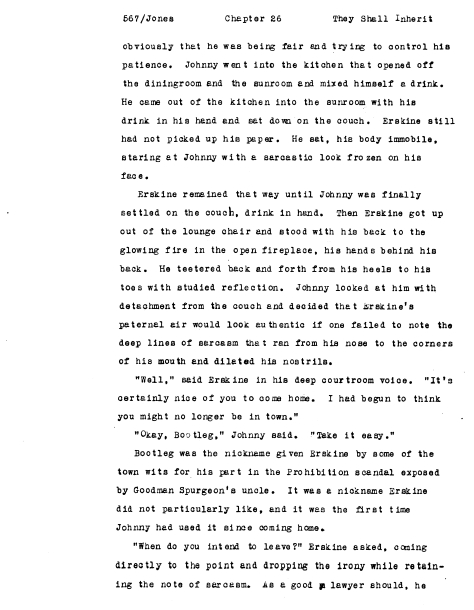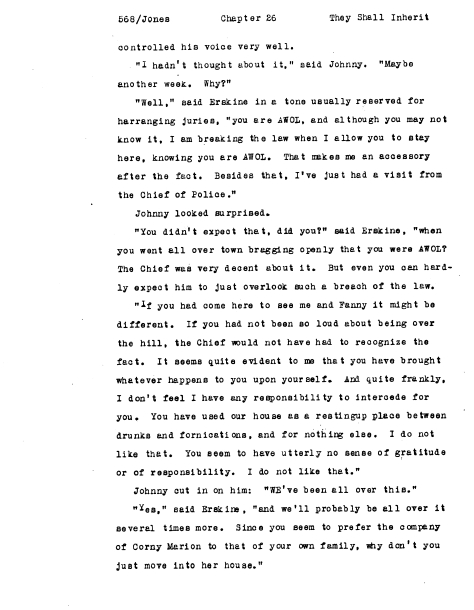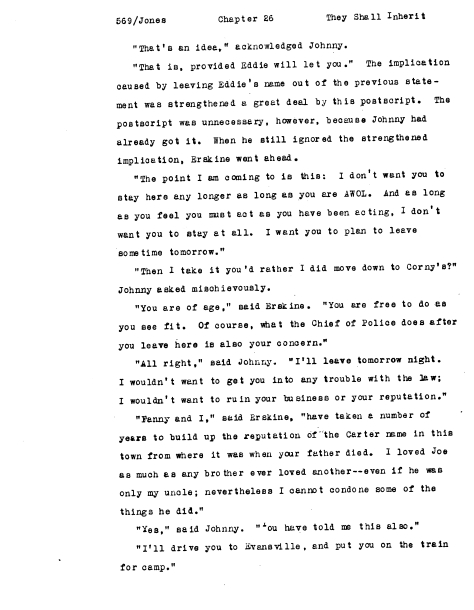To the End of the War (26 page)
Read To the End of the War Online
Authors: James Jones

“Set wasn’t bitter or hard, although Christ knows he should have been. He had plenty of reason to be. His was the kind of life to make a ‘Public Enemy of Society.’ Society makes its own enemies, and then calls them ‘criminals.’
“Set had to quit school in the eighth grade and go to work because his father got crippled on a construction job. He was fifty years old and working as a laborer. And then he got smashed up, and Set had to quit school to support his two kid sisters. All the older kids were already married with their own families beginning to grow, and they couldn’t help much.
“So Set had to work to try to support all four of them on what he could make as a kid laboring on construction jobs and railroad gangs. That was during the depression and they were laying off men everywhere. Everybody’s forgotten all about the depression now. Everybody’s working in defense plants now. And they all say a man can always get a good job if he’s got the stuff. ‘No man ever needs to go hungry, if he really wants to work.’ People forget things awful easy.
“Set kept getting laid off one job after another. And finally he got a job digging and cleaning cesspools. He cleaned cesspools under the ivy-covered walls of Harvard; that’s as near as he came to an education. He didn’t like it much. I don’t guess anybody would like working with his hands in shit all day, with the smell of it in his nostrils all day long. He didn’t like it; but he did it, he did it because at least he got some money to feed himself and his father and sisters. He could have gone on the bum and done better than that, but he didn’t want to. He could have got in the CCCs, but he wouldn’t get enough money to feed them all. And besides, he was a wop, a dago. His family meant everything in the world to him. And finally, he got laid off the cesspool job even. And he couldn’t get any work at all, no matter how hard he tried. His crippled father and two sisters were hungry all the time. They never had enough to eat.
“So finally, he joined the goddam army. Joined the army at twenty-one bucks a month. So he could get some money for them to eat.
“This makes a mighty dull story, doesn’t it? There wouldn’t be much to write a novel about there, would there? People want to read adventurous exciting things like Ernest Hemingway writes, and they don’t want to hear about this. It’s depressing to read about drunks and failures and bums—unless they’re romantic and adventurous. ‘Why do writers want to write about the poor in life and those of low estate?’ they say. ‘There are too many happy things to write about.’ They don’t think working in shit all day is exciting enough, and they don’t want to hear about it; it offends their good taste.
“I don’t know a damn thing about economics or tariffs or world trade or any the rest of that crap. But they sure don’t seem much good to me, when guys like Set Lechessi have to live like they are forced to live—and die like they are forced to die.”
Johnny was crying now. His sentences were punctuated with long racking sobs and great sighing intakes of breath as he tried desperately to keep himself from crying. Four drinks on an empty stomach; but this was no crying jag. Any spring released from heavy pressure will bound out, expand, recoil upon itself. The liquor was just enough to loosen the bonds he had clamped down tight over Al, and Weidmann, and Isaac Rabinowitz, and over Set Lechessi. That much liquor is usually necessary, even when the pressure is released; it is taught to men that it is a woman’s prerogative, and therefore unmanly, to break down, even when your soul is begging you to cry. This was the first time he had allowed himself to tell about Set, about all that had been festering in his soul for a long time.
“The third man in the company to die. He got hit in the belly with a burst of machinegun fire. It tore his belly wide open. A bunch of guys were going downhill and they got ambushed. Everybody got back over the top of the hill except Set and one other guy. Johnson. He was killed outright—but Set wasn’t.
“We laid on the back of the hill and listened to him yell for three hours, before he finally died. Our company had only been on the line for three days; we hadn’t had time to get numb yet. We could still feel. And we lay there scared to death with our faces pushed down into the grass and the heat and dust and seeds choking us and listened to Set yell. Guys who’d lived together for three years. Guys that used to get drunk together and go to whorehouses together. In a company like that, everybody gets to know all about everybody else’s life and family and plans, everything about a man. And we had to lay there and listen to Set yell and call on the Virgin Mary and think all the time we were glad it wasn’t us—and then feel ashamed. We even begged the company commander to let one of us go down over the hill after Set. He wouldn’t do it because he said we wouldn’t have a chance. There were tears in his eyes when he said it.
“A couple of guys even squirmed out into the fire and tried to get in position so they could shoot him. But nobody could do it.
“Finally, he bled to death.”
Johnny stopped talking and dropped into a chair.
“That’s a fitting epilogue to a life like he had, ain’t it? There’s an epilogue for him, and for Weidmann who got kicked out of his command because he was a Jew and some son of a bitch had a brother-in-law. They’re all in the same boat. It ain’t so much that they died or that they lost out. It’s the injustice and the waste and the uselessness and the indignity. It makes you sick to your stomach. It makes you hate. But you don’t know what to hate. It’s rottenness, just plain goddamned rottenness, and nobody you can put a finger on. It’s not that we owe them a monument or a revered memory. That don’t do them any good. That don’t mean a goddam thing. We owed them a life. Society owed them a life.
“He laid out there for three hours, three whole hours, I tell you. And all the time he was screaming and yelling for someone to help him, please somebody help him. He kept yelling he couldn’t die because he had to take care of his father. He sounded like he expected God and the Virgin Mary to miraculously heal him as soon as they understood they’d made a mistake; God hadn’t meant to kill him because he had to take care of his father. I guess he forgot about his ten thousand insurance.”
He buried his face in his hands, and great choking sobs shook his body. Sandy got up from the divan and went to his chair.
“There, there,” she said helplessly, trying to quiet him somehow. “Go ahead and cry; it’ll do you good. You’ve had it coming a long time.”
“You don’t know anything about it. What do you know about it? It’s easy enough for you to say there, there.”
“Go ahead and cry; it’ll do you good. You’ve had it coming a long, long time.”
To the end of the war. There was no end to the war. Worse than that, there was no beginning to the war. The war was not yet begun.
